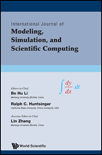
International Journal of Modeling Simulation and Scientific Computing
Scope & Guideline
Pioneering the Future of Scientific Computing
Introduction
Aims and Scopes
- Modeling and Simulation Techniques:
The journal emphasizes novel modeling approaches, including mathematical modeling, agent-based modeling, and computational simulations that address real-world problems across different domains. - Interdisciplinary Applications:
Research published in the journal spans multiple fields such as engineering, healthcare, environmental science, and information technology, showcasing the versatility of modeling and simulation in addressing diverse challenges. - Emerging Technologies:
The journal highlights the integration of advanced technologies such as artificial intelligence, machine learning, and IoT into modeling and simulation frameworks, promoting innovative solutions and methodologies. - Data-Driven Approaches:
There is a significant focus on data-driven modeling techniques that leverage large datasets for predictive analytics, including the use of deep learning and statistical methods. - Collaborative and Distributed Systems:
Research on the modeling of collaborative systems, including cloud computing and edge computing, is a core area, reflecting the growing importance of these technologies in modern applications.
Trending and Emerging
- Artificial Intelligence and Machine Learning:
There is a significant increase in research integrating AI and machine learning techniques into modeling and simulation frameworks, particularly for predictive analytics and data-driven decision-making. - Digital Twin Technology:
The concept of digital twins is emerging as a vital area of research, with applications in real-time monitoring, control, and optimization of complex systems across various industries. - Epidemiological Modeling:
Given the recent global health challenges, there is a noticeable trend in the development of sophisticated models for disease spread, particularly relating to COVID-19 and other infectious diseases. - Cyber-Physical Systems:
Research focusing on cyber-physical systems, particularly in the context of IoT and smart environments, is gaining momentum as industries seek to enhance connectivity and automation. - Sustainability and Environmental Modeling:
There is a growing emphasis on modeling approaches that address sustainability and environmental concerns, indicating a shift towards research that supports ecological and resource management.
Declining or Waning
- Traditional Statistical Methods:
There has been a noticeable decrease in the publication of papers focusing on classical statistical modeling techniques, as newer, more complex methodologies such as machine learning and AI have gained traction. - Basic Mathematical Models:
Papers centered solely on fundamental mathematical models, without integration of computational techniques or real-world applications, are becoming less common, indicating a shift towards more applied and complex modeling. - Single-Domain Studies:
Research that focuses narrowly on a single domain without interdisciplinary integration is less frequently published, as the trend moves towards studies that incorporate multiple fields and collaborative approaches. - Static Models:
There is a declining interest in static modeling approaches as dynamic and adaptive models that can capture changing conditions and interactions are increasingly favored. - Simplistic Simulation Techniques:
The journal is moving away from simplistic simulation methodologies that do not incorporate advanced computational techniques or real-world complexities, reflecting a demand for more sophisticated simulations.
Similar Journals

Frontiers of Computer Science
Navigating the Evolving Landscape of Computer Science ResearchFrontiers of Computer Science is a leading peer-reviewed journal dedicated to advancing the field of computer science through the publication of high-quality research articles, reviews, and theoretical discussions. Published by HIGHER EDUCATION PRESS, this journal has gained significant recognition, currently boasting a prestigious impact factor and ranking in the Q1 quartile for both Computer Science (miscellaneous) and Theoretical Computer Science categories in 2023. With a focus on the intersection of computational theory and practical applications, it serves as a vital platform for researchers, professionals, and students alike who are eager to contribute to and stay updated with groundbreaking developments. The journal’s scope encompasses a wide range of topics, reflecting the diverse nature of computer science today. Operating from Beijing, China, it emphasizes Open Access, ensuring that vital research is readily available to the global academic community. With its convergence period spanning from 2013 to 2024, Frontiers of Computer Science remains committed to fostering innovation and scholarly dialogue that drives the future of technology.
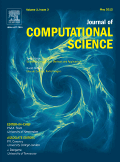
Journal of Computational Science
Elevating Computational Science to New HeightsThe Journal of Computational Science, published by Elsevier, is a premier academic journal that serves as a vital platform for researchers and professionals in the fields of computer science, modeling, and simulation. With an ISSN of 1877-7503 and an E-ISSN of 1877-7511, this journal focuses on the latest advances in computational methodologies and their applications, fostering interdisciplinary dialogue and collaboration. As of 2023, it holds an impressive Q2 ranking in multiple categories, including Computer Science (miscellaneous), Modeling and Simulation, and Theoretical Computer Science, showcasing its relevance and impact within the scholarly community. The journal features comprehensive research articles, reviews, and case studies that contribute significantly to the understanding and development of computational techniques. With its high standing in Scopus rankings, including a 79th percentile ranking in Mathematics - Modeling and Simulation, the Journal of Computational Science is an essential resource for anyone seeking to advance their knowledge and research in this dynamic field.

Human-centric Computing and Information Sciences
Fostering Collaboration at the Intersection of Technology and SocietyHuman-centric Computing and Information Sciences, published by the Korea Information Processing Society, represents a leading platform in the field of computer science, particularly focusing on the interaction between humans and computational systems. With an impressive Q1 ranking in the 2023 category of Computer Science (miscellaneous) and a commendable Scopus rank of #14/232 (94th percentile), this journal has established itself as a cornerstone for researchers and practitioners dedicated to advancing understanding in this vital area. Understanding the significance of making technology more accessible and effective for users, the journal has been an Open Access publication since 2011, promoting wide dissemination of knowledge without barriers. The journal's scope encompasses innovative methodologies, user experience design, and the integration of human factors into computing environments, making it essential reading for anyone interested in the intersection of technology and society. With all articles freely accessible, the journal not only contributes to scholarly discourse but also encourages collaboration among researchers worldwide, fostering further advancements in human-centric computing.

Computational and Mathematical Methods
Fostering Collaboration for Groundbreaking Computational ResearchComputational and Mathematical Methods is a dynamic peer-reviewed journal published by Wiley-Hindawi, focusing on innovative research in the fields of computational mathematics, mechanics, and theory. Since its transition to an Open Access format in 2022, the journal has enhanced its accessibility to researchers and practitioners globally, providing a platform for the dissemination of high-quality studies that contribute to emerging developments in mathematical modeling and computational techniques. Based in the United Kingdom, this journal is committed to fostering collaboration amongst scholars, evidenced by its rankings within Scopus: Q3 in computational mathematics, computational mechanics, and computational theory and mathematics, reflecting its relevance and influence within these critical fields. With an emphasis on interdisciplinary studies, Computational and Mathematical Methods is an essential resource for researchers, professionals, and students seeking to expand their knowledge and apply cutting-edge methodologies to practical challenges.
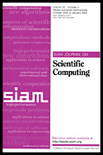
SIAM JOURNAL ON SCIENTIFIC COMPUTING
Fostering Excellence in Scientific Computing ResearchSIAM Journal on Scientific Computing is a premier journal published by SIAM Publications, focusing on the interdisciplinary domain of scientific computing. With a significant standing in the academic community, this journal boasts a 2023 Q1 ranking in both Applied Mathematics and Computational Mathematics, positioning it among the top-tier publications in these fields. The journal aims to disseminate high-quality research that applies computational methods to solve scientific and engineering problems, fostering advancements in numerical analysis, algorithms, and software development. Researchers and professionals can greatly benefit from the journal's rigorous peer-review process and its reputation for publishing cutting-edge studies. Though it is not an open-access journal, subscribing institutions and individual subscribers gain access to a wealth of knowledge tailored for those seeking to enhance their expertise in scientific computation. With its established history since 1996 and continuing to publish until 2024, the SIAM Journal on Scientific Computing remains an essential resource for students, researchers, and professionals dedicated to pushing the boundaries of this dynamic field.

Applied Computing and Informatics
Elevating Standards in Applied Computing and InformaticsApplied Computing and Informatics, published by Emerald Group Publishing Ltd, is a prominent open-access journal that has been serving the academic community since 2011. With a focus on advancing the fields of Computer Science Applications, Information Systems, and Software, this journal has established itself as a noteworthy publication, currently ranking in the Q3 quartile for each of its categories in 2023. The journal is particularly recognized for its commitment to disseminating high-quality research, as evidenced by its impressive Scopus rankings—placing it in the 92nd percentile for Computer Science Applications and the 91st percentile for both Information Systems and Software. Based in Saudi Arabia, it adopts a global perspective, inviting contributions from researchers worldwide. With its open-access policy, Applied Computing and Informatics ensures that cutting-edge research is accessible to a broad audience, fostering collaboration and innovation within the computing and informatics disciplines. This journal is an essential resource for academics, professionals, and students seeking to keep abreast of the latest trends and developments in their field.
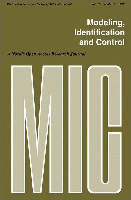
MODELING IDENTIFICATION AND CONTROL
Fostering Collaboration Across Engineering DisciplinesMODELING IDENTIFICATION AND CONTROL is a prominent academic journal dedicated to the fields of Computer Science Applications, Control and Systems Engineering, Modeling and Simulation, and Software. Published by MIC in Norway, this open access journal has been providing valuable insights and innovative research since 1980, promoting the free dissemination of knowledge. With a reputation reflected in its 2023 quartile rankings—Q3 in Computer Science Applications, Q2 in Control and Systems Engineering, and Modeling and Simulation, as well as Q3 in Software—this journal plays a vital role in advancing theoretical and practical solutions within its disciplines. Researchers and professionals benefit from its rigorous peer-review process and impactful publications, fostering collaboration and the exploration of emerging technologies across various applications. The journal's continual commitment to excellence is exemplified by its active presence in Scopus, where it maintains respectable rankings in relevant engineering and computer science subcategories, supporting its goal to be a pivotal resource for scholarly communication and practical advancements.
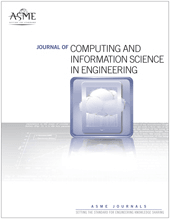
JOURNAL OF COMPUTING AND INFORMATION SCIENCE IN ENGINEERING
Pioneering Research in Computing and Engineering DisciplinesWelcome to the JOURNAL OF COMPUTING AND INFORMATION SCIENCE IN ENGINEERING, a premier publication from ASME that focuses on the dynamic intersection of computing and engineering disciplines. With an ISSN of 1530-9827 and E-ISSN 1944-7078, this journal serves as a critical platform for disseminating innovative research and advancements in areas such as Computer Graphics, Computer-Aided Design, Software Engineering, and Industrial Manufacturing. The journal spans from 2001 to 2024 and has been recognized for its excellence, boasting impressive Scopus rankings including Q1 in Industrial and Manufacturing Engineering and Q2 in both Computer Graphics and Computer Science Applications. It offers a unique opportunity for researchers, professionals, and students to engage with high-impact studies and present their contributions to a diverse audience. As a member of the esteemed ASME family, this journal promotes open dialogue and fosters the growth of knowledge in technical fields, while emphasizing practical applications and interdisciplinary collaboration. Join us in exploring the forefront of computing and engineering through rigorous research and insightful articles that drive innovation and progress.

International Journal on Information Technologies and Security
Fostering Collaboration in Cyber ResearchInternational Journal on Information Technologies and Security, published by UNION SCIENTISTS BULGARIA, is a pivotal interdisciplinary journal that explores the rapidly evolving fields of information technology and security. With a robust ISSN of 1313-8251, this journal serves as a platform for researchers, professionals, and students to disseminate their findings and innovations in cybersecurity, data protection, and IT system integrity. The journal's commitment to open access enhances accessibility, ensuring that pivotal research reaches a broader audience, encouraging collaboration and advancement in these critical areas. As an invaluable resource for those engaged in the study and application of information security measures, the International Journal on Information Technologies and Security plays an essential role in shaping the discourse and driving forward the knowledge necessary to tackle today’s technological challenges.
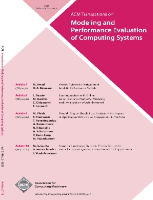
ACM Transactions on Modeling and Performance Evaluation of Computing Systems
Pioneering Insights into Computing Systems Performance.ACM Transactions on Modeling and Performance Evaluation of Computing Systems, published by the Association for Computing Machinery, is a leading journal dedicated to the exploration of innovative modeling techniques and performance evaluation methodologies applicable across various computing systems. With an ISSN of 2376-3639 and an E-ISSN of 2376-3647, this esteemed journal serves as a vital resource for researchers, professionals, and students within the computer science community, particularly in the categories of Computer Networks and Communications, Hardware and Architecture, and Software Engineering. Its impressive impact factor, marked by a categorization in the prestigious Q2 and Q3 quartiles across several fields, demonstrates its significant contribution to advancing knowledge in performance evaluation and modeling. Though currently not open access, the journal provides invaluable insights that enhance understanding of safety, risk, reliability, quality, and other critical aspects of computing systems. By bridging theoretical foundations with practical applications, ACM Transactions is essential for those seeking to push the boundaries of computing systems performance and reliability, making it an indispensable addition to any researcher’s or practitioner’s academic toolkit.